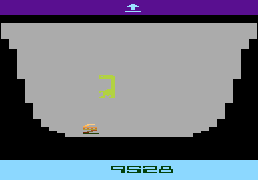Why are we okay with unlocks? (Opinion)
By FireBurger 66 Comments
Why are we okay with unlocks? How did we get to the point where we’re okay with paying full price for a product, but not having full access to that product right away?
I’ll admit, when unlocks were first introduced in games like Battlefield 2 – and then widely popularized in games like Call of Duty 4 – I loved the idea. I loved mixing and matching classes, weapons, attachments, and perks. I loved having a “unique” game experience that I could tailor to myself and my play-style. I loved the anticipation – having something to look forward to. And, yes, some unconscious part of me assuredly loved the endorphin rush produced by Call of Duty’s ba-dun-DUN-DUN-DUNT every time I hit a new rank.
However, roughly 10 years after the widespread introduction of unlocks in every genre of game imaginable, I find myself weighing the pros and cons of the unlock structure, examining more closely the “benefits” the structure truly provides, and considering the rights we’ve willingly relinquished as consumers.
I will demonstrate what I view as the cons of the structure, the pros of the structure, and then consider the instances where I do think unlocks are appropriate and positive. Finally, I’ll consider the wider implications of “unlocks” and how they’ve evolved uniquely in games. Here we go!
Cons
You’ve paid full price, but don’t have a full game
You’ve gone to the store, paid $60 for Call of Duty: Black Ops 3, gone home, excitedly booted up multi-player for the first time, jumped into your first game…and realized you have access to 4 of 9 specialists, 12 of 31 weapons, 1 of 6 lethals, 1 of 7 tacticals, 9 of 18 perks, 3 of 19 scorestreaks, and 0 of 10 wildcards. All in all, you realize you have access to 30% of the game (maps and modes excluded).
The only solution? Spend hours upon hours playing the game until you’re allowed access to the game and features you’ve already paid for. Personally, I’ve spent 83 hours playing Battlefield 4 and still don’t have all of the unlocks available to me. If I were to suppose a modest earning potential of $15 per hour, I’d have essentially invested a total of $1,305 on the game, and still not be allowed full access to it. True, I wasn’t doing manual labor or working in a cubicle for those 83 hours – I was playing and mostly enjoying the game of my own volition – but the fact stands that I was not getting the full experience or having as much fun as I could have been having, despite the massive investment of time and money.
Imagine paying $40,000 for a new car and having to drive 100,000 miles before the heated seats start functioning. Or how about paying $75 for a new coffee maker and having to brew 200 pots before being able to use the timer function? Would the “thrill of anticipation” be enough to justify either of those scenarios to you?
Gameplay no longer needs to stand on its own two legs
Remember when the only way developers could ensure you played their game for a long time was by building great gameplay and unique concepts?
Surely, many developers still pour their hearts and souls into their projects, but it cannot be ignored or denied that unlocks have provided an easy route for developers to keep us invested in their games. Need empirical evidence? Look no further than Clicker Heroes; the game consists of nothing more than repeatedly clicking (and clicking and clicking and clicking) to level up and unlock new abilities (click for more damage). That’s it. Yet currently the game has 90% positive reviews with 22,499 ratings on Steam. Yes, the game is satire, but it’s successful satire for a reason: it works and developers know it.
When I hear people complain that they’ve lost interest in a game because there aren’t enough unlocks or “the carrot on the stick” isn’t good enough, what they’re saying is one of two things:
1) “I’ve lost interest in the gameplay, but could be kept interested in the game by the thrill of unlocking more things.”
See: Clicker Heroes. If the whole reason we’re continuing to play a game is to just unlock more stuff, what are we really doing with our time?
2) “I’ve lost interest in the gameplay because of lack of variety and play-styles and think that more unlocks would add that variety.”
I’d say that’s a very valid point. However, is the real issue that there aren’t enough unlocks or that there isn’t enough variety, period. Would it be less fun if you had access to that grenade launcher from the beginning? Yes, doling out features over time can sometimes keep things fresh, but if you were to have access to Black Ops 3’s 100 unlocks from the beginning, do you really think you’d blow through all of those combinations in a few hours. No, you’d continue to experiment and evolve your play-style, but with the freedom to do so at your own pace, and however you want.
Multi-player is unbalanced
No matter what, unless everyone in a competitive multi-player match has access to the exact same weapons/tools/perks/abilities/whatever, then the game is inherently unbalanced. Sure, one weapon can have pros and cons versus another, but show me the game where all of the weapons are perfectly balanced and used in equal numbers. Over time, every game devolves to a handful of “player-base approved” weapons, and if they’re not the starting weapons, then the game is unfair to new players. Even if the starting weapons are the “best”, there will always be those players who do best with other, locked weapons. If it’s not all available to everyone, it’s unbalanced. Period.
Would it be a fair match if Federer played Djokavic and Federer had to play with the shoes and racket that were handed to him while Djokavic was able to pick his out, despite the pros and cons of the two sets of equipment? I don’t think so – and that’s a generous scenario where we assume one set is not inherently worse than the other, which often happens in games.
Unlocks can actually make the game repetitive before it should be
If a game’s unlock structure is not properly built, and the unlocks are not delivered at proper intervals, you can actually become bored with a game before experiencing all of its content. There are numerous games that I’ve stopped playing before unlocking everything. I got bored. I had exhausted the content available to me. Perhaps, if that content were available to me, I would have been able to mix things up, try something different, and keep having fun with the game. Instead, I put the game down – I don’t get full enjoyment of the product I paid for and the developer loses my attention before they might have otherwise. That’s the potential for a lose-lose.
Pros
We have something to look forward to
Unlocks give us something to look forward to – something new to use that we didn’t have access to an hour ago. They keep the game fresh in a way. We get to anticipate using a new weapon, a new play-style, or a new strategy, and we get the thrill of finally reaching our goal and unlocking that elusive “thing.”
However, I think it’s more fun to have Metal Gear Solid 5 in my hands than anticipate its release. As stated earlier, I think as long there is enough variety available from the start, I’ll continually anticipate trying new combinations, trying new strategies, and trying new play-styles, but at my own pace and exactly how I want to.
We are forced to mix things and encouraged to try new combinations
Some people may view being forced to do anything as a negative, but I think it’s good to not be able to settle into groove and ignore content we may otherwise enjoy. By progressing through the unlock structure, we are forced to use weapons, perks, abilities, etc., that may not be our favorite or even the best, but they’re the best we have at that moment. It helps keep the game fresh.
However, I think there are other ways to accomplish this goal. One that comes to mind is the MOBA-style banning of characters, weapons, skills, etc. (Note: I’m not advocating the “MOBAzation” of everything that’s currently happening!). I’ve not seen it used, but another method I can imagine is, every match, the game could dictate a handful of weapons, perks, and equipment that is available to players from the wider selection in the game, again forcing players outside of their comfort zone without outright locking away content.
We get to feel special and unique
We have an emblem, weapon, skin, or emote that no one else in the match has. We get to feel special and show others that we’ve accomplished something.
However, is that worth creating unbalanced multi-player gameplay? Even if the unlocks are solely cosmetic (which is an improvement) does Joe Schmo deserve to be denied access to that cool beard just because he doesn’t have 20+ hours to spend with the game. He paid for it; should he be punished for not having enough free time? If a developer wants to grant us a way to feel unique, give us an emblem, weapon, armor, or car skin editor.
We get to learn the mechanics appropriately over time
By unlocking game features slowly over time, we get a chance to learn the basics and work our way up the curve appropriately; it ensures we don’t get overwhelmed or miss out on some crucial feature.
However, I think it can become a lazy excuse for a lack of a good tutorial. Note, I say a good tutorial – not a boring, dry, tedious exercise. If teaching the mechanics slowly over time is the sole reason for having unlocks, then there are other methods to accomplish that same goal without the negative side effects of unlocks. Teach us about your game in fun, inventive, interactive ways that don’t lock away content.
We feel a sense of achievement
It’s nice, after spending 20 hours with a game or nailing that headshot across the map, to be recognized for it. Really, the only way to accomplish this feeling is by unlocking something.
However, I think there are “unlocks” that accomplish this and are not as detrimental to the experience as the current unlock structure in most games. As stated earlier, purely cosmetic unlocks are an improvement, but can still punish certain players by barring them from neat content. Ever since Battlefield 2 and Call of Duty 4, stat tracking, medals, badges, and challenges have existed to lend that sense of achievement without locking up any content; sure you can’t strut around like a proud peacock with an orange weapon skin, but in combination with a solid social platform like Steam or Battlelog, you can still show off your accomplishments. If we must have an unlock, something like title cards are peripheral and specific enough that no one will be slighted if they don’t have them from the start.
OK, so where do unlocks work well (and are there problems even there)?
I don’t mean to say that unlocks have no place in video games; they certainly do. However, it needs to be in an appropriate type of game or game mode. Single-player games and role-playing games are both excellent spaces for unlocks; they often tell the story of a character’s progression or rise to power, and levels and unlocks, while contrived, make sense. Additionally, cooperative multi-players games with a strong story element can be appropriate for the same reasons.
That said, I’m of the mind that if you really want to, you should be able to unlock any ability in a single-player game from the beginning (of course with warnings that you’re breaking the game and destroying any authorial intent). If you paid $60 for Fallout 4, I want you to be able to go home, boot it up, and start firing off Fat Man nukes at rad roaches if that’s all you want to do. Again, not everyone has the time or ability to spend 30+ hours with a game, so if they want to break the game for themselves, why not let them? Anyone remember when developers actually gave us cheat codes?
Furthermore, I think players should have the choice to skip to whatever part of the game they want (again with disclaimers about breaking the experience). If you’ve heard that the nuke level in Call of Duty 4 is awesome, why are you forced to play through the rest of the game if you don’t want to? I can pick up any book and skip to any chapter, or even read the last page while still standing in Barnes and Noble. When I pop in the Mission Impossible: Rogue Nation blu-ray, I can go to the chapter select and jump to any part of the movie I want.
Why have unlocks evolved in games?
As stated, other media do not have the same structures or restrictions when it comes to unlocks, so why are games unique? I’d suppose it comes from video games’ origins in the arcade. Back then, developers wanted to gate progress and lock away levels and weapons as a means to entice players to keep popping in their quarters. As games moved into our living rooms, these structures naturally followed along without question. These many years later, when developers started to add more and more unlocks (and restrict more and more content), the precedent was already in place, so went largely unquestioned.
Conclusion
Despite my objections, I think unlocks were originally implemented with good intentions by developers trying to find fun, new ways to mix things up. I also think plenty of developers still pour their hearts and souls into their projects regardless of the unlock structure. However, I think unlocks have gotten out of hand and are now doing more harm than good. Most troubling, however, is that fact that we seem to accept their existence without question; we really only complain when Destiny sells a $30 shortcut, but no longer ask why that content is locked to begin with.
Overall, though, the issue comes down to a matter of priorities and consumer agency. If what you value most is the anticipation and thrill of unlocking new content and the ability to show off your trophies, you may fall on one side of the argument. Alternatively, if what you value most is balanced competitive gameplay, player agency, and consumer rights, you may fall on the other. Neither is right, and neither is wrong. At the end of the day, it’s a matter of consumer agency. We have the ability to set our own priorities and decide whether to buy or not buy any game. However, that doesn’t mean we can’t have a thoughtful discussion and see if there is a majority consensus in the community.
So, where do you fall? Do you think unlocks are good? Bad? Somewhere in-between? Do you have alternative ideas that could accomplish the same goals?



Log in to comment